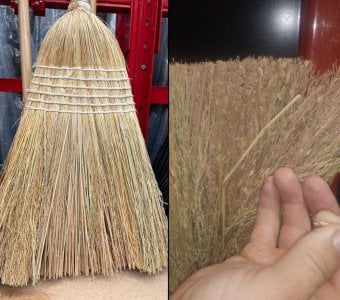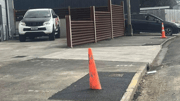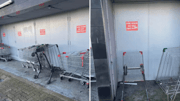Bunnings forces to pull out item from shelves due to biosecurity risks
By
Seia Ibanez
- Replies 24
Imagine the potential chaos if a small oversight led to a nationwide biosecurity threat.
While such incidents often seem far removed from everyday life, they can begin in the most unexpected places.
Bunnings Warehouse, a household name and go-to destination for DIY enthusiasts, has taken swift action by removing an item from its shelves due to a 'mammoth' biosecurity risk.
The item in question? Millet brooms, a seemingly innocuous cleaning tool, became the centre of a potential environmental crisis.
One customer, with a keen eye and a background in local rice cultivation, spotted something alarming while browsing the aisles of a Bunnings store in the NSW Riverina region.

Embedded in the brooms were what appeared to be rice grains, a discovery that set off alarm bells due to the potential introduction of invasive insects and pests into Australia.
This customer wasn't just any shopper; he was a former rice grower with 20 years of experience. His expertise in the field meant he understood the gravity of the situation immediately.
'I could see these grains in the head of the broom, and on closer inspection, I nearly fell over because I'm absolutely certain they were rice grains... The biosecurity concerns are just mammoth,' he said.
The Riverina region, where the discovery was made, is a critical area for Australia's rice production. It boasts ideal conditions for growing rice, free from the diseases or pests that could threaten crops.
Introducing foreign plant material, especially from a country like China where these brooms were imported from, could disrupt this delicate ecosystem and have devastating effects on local agriculture.
Upon learning of the potential threat, Bunnings acted immediately. They removed the millet brooms from sale and launched an investigation in collaboration with the Department of Agriculture, Fisheries and Forestry (DAFF).
Bunnings reassured the public that they take biosecurity 'very seriously' and that the brooms had undergone rigorous heat treatments and fumigation to neutralise any viable seed material.
‘As soon as we became aware of these concerns and out of an abundance of caution, we removed the brooms from sale,’ a spokesperson said.
‘We strictly follow the biosecurity requirements for all imported products and can confirm the product underwent heat treatments at high temperatures for 24 hours and methyl bromide fumigation to ensure any seed material that may be remaining is unable to germinate.’
The vigilant shopper, Keith Rowe, initially took to social media to raise awareness about the issue.
His posts caught the attention of Biosecurity Australia, prompting further investigation. 'Supposedly, millet looks like rice to me,' he wrote.
It's currently unclear how widespread the distribution of these millet brooms was across Bunnings stores nationwide and whether other brooms contained rice plants.

Have you ever encountered a situation where a product you purchased posed a risk to our biosecurity, or do you have any tips on how to spot such risks? Share your stories and advice in the comments below.
While such incidents often seem far removed from everyday life, they can begin in the most unexpected places.
Bunnings Warehouse, a household name and go-to destination for DIY enthusiasts, has taken swift action by removing an item from its shelves due to a 'mammoth' biosecurity risk.
The item in question? Millet brooms, a seemingly innocuous cleaning tool, became the centre of a potential environmental crisis.
One customer, with a keen eye and a background in local rice cultivation, spotted something alarming while browsing the aisles of a Bunnings store in the NSW Riverina region.

Bunnings removed an item due to biosecurity risks. Credit: Warwick Long / ABC and @Rowey_brolga / Twitter
Embedded in the brooms were what appeared to be rice grains, a discovery that set off alarm bells due to the potential introduction of invasive insects and pests into Australia.
This customer wasn't just any shopper; he was a former rice grower with 20 years of experience. His expertise in the field meant he understood the gravity of the situation immediately.
'I could see these grains in the head of the broom, and on closer inspection, I nearly fell over because I'm absolutely certain they were rice grains... The biosecurity concerns are just mammoth,' he said.
The Riverina region, where the discovery was made, is a critical area for Australia's rice production. It boasts ideal conditions for growing rice, free from the diseases or pests that could threaten crops.
Introducing foreign plant material, especially from a country like China where these brooms were imported from, could disrupt this delicate ecosystem and have devastating effects on local agriculture.
Upon learning of the potential threat, Bunnings acted immediately. They removed the millet brooms from sale and launched an investigation in collaboration with the Department of Agriculture, Fisheries and Forestry (DAFF).
Bunnings reassured the public that they take biosecurity 'very seriously' and that the brooms had undergone rigorous heat treatments and fumigation to neutralise any viable seed material.
‘As soon as we became aware of these concerns and out of an abundance of caution, we removed the brooms from sale,’ a spokesperson said.
‘We strictly follow the biosecurity requirements for all imported products and can confirm the product underwent heat treatments at high temperatures for 24 hours and methyl bromide fumigation to ensure any seed material that may be remaining is unable to germinate.’
The vigilant shopper, Keith Rowe, initially took to social media to raise awareness about the issue.
His posts caught the attention of Biosecurity Australia, prompting further investigation. 'Supposedly, millet looks like rice to me,' he wrote.
It's currently unclear how widespread the distribution of these millet brooms was across Bunnings stores nationwide and whether other brooms contained rice plants.
Key Takeaways
- Bunnings removed millet brooms from its shelves due to an eagle-eyed customer recognising a possible biosecurity risk from rice plants imported with the brooms.
- The risk was spotted in the NSW Riverina region, an area with conditions favourable to rice growing and free of many diseases and pests.
- Bunnings is working with the Department of Agriculture, Fisheries and Forestry to investigate the issue and has contacted suppliers and the quarantine regulator.
- The brooms underwent heat treatment and fumigation to ensure seeds could not germinate but were still removed from sale as a precaution.







